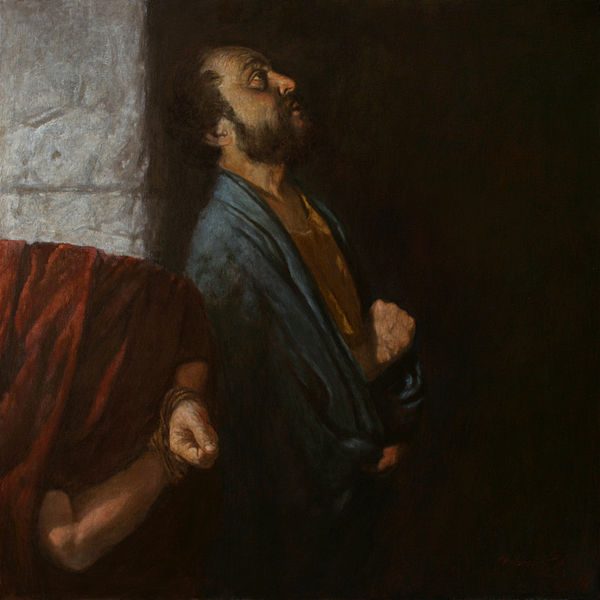
Compare Matthew 26:55, 67-75; 27:1-2; Mark 14:49, 65-72; 15:1; Luke 19:47; 22:53, 63-65; John 2:19; 18:25-27
My longtime friend and colleague John W. Welch, who is not only a professor of law but a superb scholar of the Bible and antiquity, has published several items about the trial of Jesus. See the list here, for example.

(Wikimedia Commons public domain image)
Compare Luke 22:56-72; John 18:15-18
In connection with this story, please read Elder Spencer W. Kimball’s defense of “Peter, My Brother.”
See, too, this discussion — and particularly, toward the end, the citation of John Hall’s argument that Jesus’s statement (that Peter would deny him) may not have been so much a prophecy as an order.

Albrecht Dürer, 1503
Wikimedia Commons public domain
Compare Luke 22:66
There’s a certain black humor — perhaps intended, perhaps not — in John’s little detail about how the chief priests and elders decline to enter into the praetorium, lest they be ritually defiled just before the Passover while they’re engaged in orchestrating a judicial assassination.
“For I desired mercy, and not sacrifice; and the knowledge of God more than burnt offerings.” (Hosea 6:6)
“Wherewith shall I come before the Lord, and bow myself before the high God? shall I come before him with burnt offerings, with calves of a year old? Will the Lord be pleased with thousands of rams, or with ten thousands of rivers of oil? shall I give my firstborn for my transgression, the fruit of my body for the sin of my soul? He hath shewed thee, O man, what is good; and what doth the Lord require of thee, but to do justly, and to love mercy, and to walk humbly with thy God?” (Micah 6:6-8)
On a much lower level of importance: I grew up in a part-member family where — until, around the time of my mission, my father converted and my mother got more serious — coffee was regularly consumed by both the member and the non-member. There was a rather strange Church member whom we knew who would visit us, but who often declined to bring her children into the house lest they catch a whiff of coffee. Several times, she arrived to tell us with delight that one or the other of her daughters was about to have a baby — out of wedlock. When my mother once asked whether their being unmarried didn’t concern her a bit, she responded that the important thing was to bring the little spirits down from heaven and give them bodies. Working as a nurse in a hospital, she eventually abandoned her own husband and children to run off with one or her patients, but not before he had read the Book of Mormon through. I hope and expect that there’s an insanity defense in heaven.
Posted from London, England











